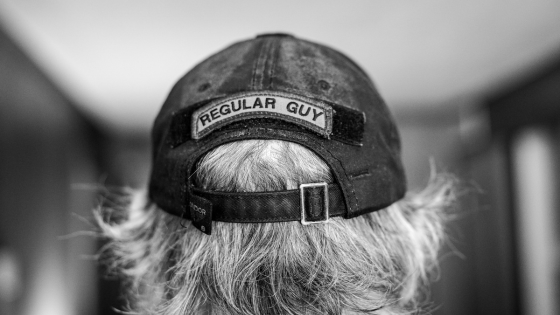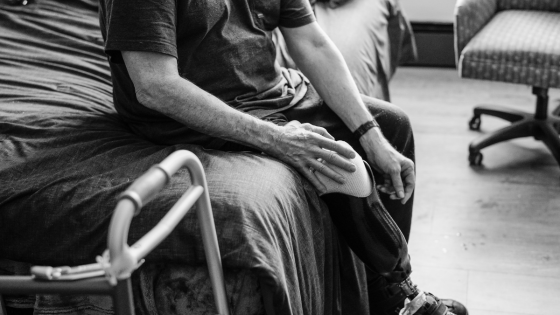In America, we proudly honor our military veterans and their service; it’s rooted in our tradition to commemorate battles won.
Yet, we can forget that some battles don’t end in the trenches.
Many veterans return home carrying visible and invisible scars. Some struggle to transition from soldier to civilian and can spend a lifetime seeking stability and purpose.
While veterans are less likely to experience poverty, they are at a heightened risk for disability—often resulting from service-related injuries, mental illness, substance abuse, homelessness and social isolation. These risks can be amplified by food insecurity. The confluence of challenges that can come with aging only worsens the problem.
Nearly one-half of all veterans in the United States are 65 years or older, and it’s more critical than ever for service organizations to step up to meet the complex needs of homebound senior veteran populations.
The Meals on Wheels network annually serves nearly 350,000 grateful veterans by delivering regular nutritious meals. A meal is often more than a meal for seniors; it keeps them healthy and strong, gives them hope and communicates that they aren’t alone.
Meals on Wheels local programs, volunteers and partner organizations believe the best way to show gratitude to our veterans and their commitment is to provide the care, services, and support systems they need to live and age with the dignity worthy of their bravery.
We also believe in telling their stories to preserve their proud individual legacies.
Michael Snodgrass, the Soldier
Fairbanks, Alaska, resident Michael Snodgrass still carries the youthful exuberance of a native Californian— flashing long silvery hair, a magnetic smile, the easygoing vibes of a surfer, and rocking a weathered black ball cap with the words “regular guy” velcroed just above the back strap.

Michael, who joined the military as an audacious teenager in 1975, was born in San Bernardino, known as the “Gateway to Southern California,” just 60 miles east of Los Angeles and west of the lush San Bernardino National Forest.
At the time, then 18 years old, Michael was a door-to-door salesman, traveling across the country soliciting magazine subscriptions, eventually landing in Hartford, Connecticut.
He later returned West to Kansas to live with his brother, who’d enlisted in the Army. Michael, with no plans of his own, decided to join him.
What happened next was anything but a part of their plan.
“We wanted to go [to the Army] together for a buddy system, and somehow [my brother] got in a motorcycle accident, and I was on the bus waving goodbye to him,” Michael remembers.
Michael was thrust into the military alone and uncertain. Yet, to him, everything in life is an adventure. This was no exception.
As Michael describes it, by sheer dumb luck, he ended up in Fort Ord, California, for training, only 360 miles and some six hours northwest of his hometown. After training, he volunteered for duty at Peden Barracks, a former U.S. Army installation in Wertheim, Germany, 89 kilometers or just over 55 miles southwest of Frankfurt.
They attached a note, written in German, to his uniform and shipped him out.
Michael has vivid memories of giant snowflakes on the windshield of a taxi, walking through a towering archway that felt like entering a castle, and two Military Police officers who translated the note pinned to the breast of his fatigues and sent him in the right direction.
In Germany, he was assigned to the artillery unit as a radio operator, where he strung communications from artillery to artillery piece.
After three years, in 1978, Michael returned home on leave, met his wife, reenlisted in the Army despite her protest, and began work at a precious metals refinery in California. Michael was part of a one-man gold division, refining placer gold found in the sands and gravels of streams from Alaska.
The remainder of Michael’s service took a series of unexpected turns, including two infantry tours, the first of which nearly saw him serve on the front lines in Afghanistan before a helicopter crash derailed the mission; a second unaccompanied tour—without his wife and child—in Germany as a sergeant before he was called home to help care for his young son, who was experiencing breathing problems; and work as part of a recruiting battalion, before he was offered the opportunity to relocate to Alaska.
“I said, ‘Where's Alaska?’ and one of the recruiting guys shows me this map he's got on his wall, and Alaska is over there by Mexico,” Michael recalls.
Traditional maps detach, shrink and position Alaska below the southwestern United States region.
The last frontier was far from the paradise Michael envisioned.
Michael recalls spending 10 days atop a glacier with fellow battalion members, with only a few candy bars to their name, testing communications equipment and waiting for favorable weather landing conditions to retrieve them by helicopter.
Leaping in, without hesitation, was the transient life Michael chose, again and again, until he didn’t.
One day, after 14 years and seven months in the Army, Michael decided to move on to the next adventure.
Michael Snodgrass, the Civilian
There was an uneasiness about moving back to California. Michael had been gone so long that the emotional connection to his hometown was completely severed. Lost in the jumble of trees, new homes and buildings was any sense of place. Feeling displaced and charmed by Alaska, Michael decided to make Anchorage his permanent home.
Michael’s post-military career included working in the restaurant industry and driving a shuttle at Ted Stevens International Airport. It was a much less eventful existence than the unpredictability of military service.
Everything changed last fall.
Over time, diabetes had ravaged Michael’s right foot, which developed a series of painful ulcers and severe neuropathy—the simple act of putting on shoes became daunting.

Michael and his doctor at the Joint Base Elmendorf-Richardson Hospital decided it was time to amputate his right leg below the knee.
The procedure was completed on Michael’s birthday, September 28.
In the months that followed, Michael endured intense pain, recovery and adjusting to life as an amputee, including the phantom feeling of wiggling toes, known as phantom limb sensation, while coming to terms with his decision to give up driving. He faced the reality that he could no longer work as a driver or live out of his car.
Older veterans are more likely to have a functional disability than other older adults; Michael was now among that statistic.
Michael recalls each day, as he recovered in Fort Ridge, a regular caretaker, Laura, was intent on helping him find a permanent home. She eventually connected him with a program in Fairbanks and assisted in coordinating his relocation.
“She had somebody else come in and talk to me,” Michael remembers. “They qualified me and had somebody sponsor me to fly from there to here. It was Changepoint Church that I used to deliver bagels to [as a driver].”
It was a full-circle moment.
Michael, a homeless veteran, was bound for a new city and a new beginning, taking his few belongings, including a wheelchair and a few articles of clothing and his infectious optimism.
Fairbanks
Michael initially lived in the Fairbanks Mission. However, the feeling of prolonged impermanence and isolation was increasingly unsettling. Michael had his “own corner of life” in the Mission, access to a shower and three meals a day. Yet, he had little interaction with others and longed for a permanent home and welcoming community.
“I lived in the barracks,” Michael shares, recalling the routine sound of artillery during his time in the military. “I just want quiet. I’m 67 years old, I need to slow down a little bit.”
He eventually relocated in August of this year to a studio apartment. And thanks to the HUD-Veterans Affairs Supportive Housing (HUD-VASH) program, rental and utility assistance were provided.
Only weeks after settling into his new home, Michael was introduced to the
local Meals on Wheels program in Fairbanks and made a call to inquire about his eligibility.
Volunteer coordinator Ashley Edgington vividly remembers their first conversation. “He was asking for simple things,” Ashley says; the most memorable request was a toothbrush, prompting her to scour the organization’s donation closet to find one.
Ashley quickly recognized Michael needed many of the everyday things we often take for granted. She knew for a homeless veteran, meeting basic needs can be life-altering and a catalyst for reclaiming independence.
Michael now receives a regular delivery of nutritious food from Meals on Wheels that he calls a “lifesaver.” Because of Michael’s limited mobility and modest resources—he lives paycheck to paycheck through social security—services like Meals on Wheels are vital.
For Michael, having reliable meals is everything to someone who doesn’t have much. It’s one less worry and expense.
He feels fortunate to live in Fairbanks, “The Golden Heart City,” where kindness is abundant and where dedicated organizations like the local Meals on Wheels program in Fairbanks can seamlessly set up a food delivery schedule for him, filling a crucial service gap, even in the harshest winter conditions.
The local Meals on Wheels program, alongside organizations that donated welcome amenities to Michael—tables, chairs, a television, and more—demonstrate the spirit of service dyed into the Fairbanks community, where the veteran community also goes above and beyond to care for its own.
There’s a strong military presence in Fairbanks, with three military bases within 2 hours of each other. Unsurprisingly, fate would place Michael here.
Among Michael’s many new friends is a 29-year-old Marine Veteran he met in the Mission who regularly visits him to take out his trash and walk across the street to check his mail. This task can be particularly treacherous during Fairbanks winters for an aging amputee with the accumulation of ice and snow, temperatures that regularly dip to 10 below and nearly endless darkness.
Regardless of age, veterans are generally more likely to have at least one characteristic of isolation than nonveterans (34% compared with 27%, respectively). Regular visitors, like Meals on Wheels volunteer Jane, whom he patiently waits for in his chair near the window, help combat isolation and are part of the caretaker network that ensures Michael has everything he needs.
The weight of the past has never burdened Michael, nor has his youthful California exuberance waned despite the challenges and hardships he’s endured.
After a life of service, Michael still dreams of spending the twilight of his life passing time on a front porch, nestled in a rocking chair. But he also loves the simplicity of his cozy rustic digs, the kind souls he encounters daily, and the comfort of steady nutritious meals like hearty chili.
He considers this his little slice of “heaven.”